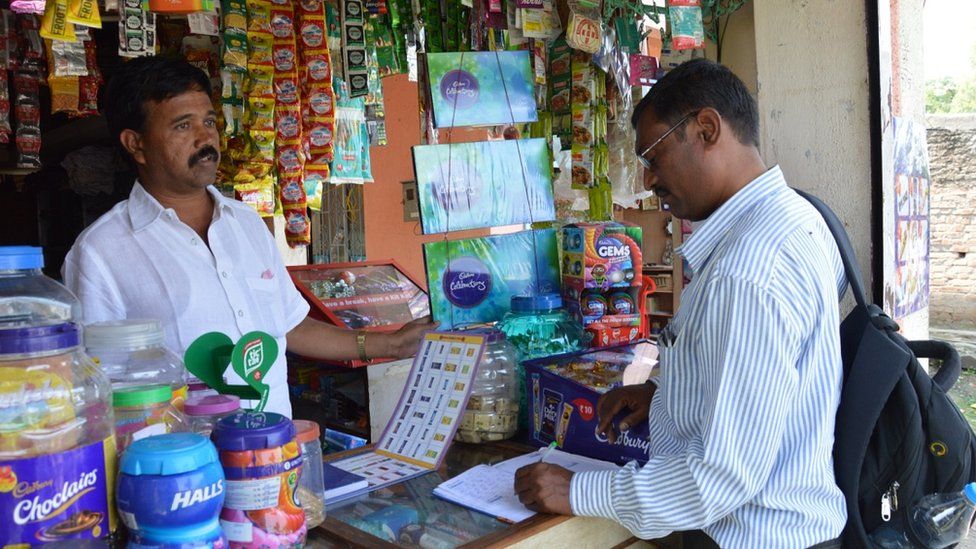How drought is making it harder to sell in rural India
- Published

On a sunny afternoon a sales executive from the US multinational food company Mondelez International is out and about in the village of Wing in Maharashtra in western India.
He is here to boost sales of Cadbury's chocolates - the brand is owned by Mondelez - and expand the reach of the US firm's products in rural India.
But doing this is probably not as sweet as the chocolate.
To entice people into buying chocolates there are banners showcasing bars of 5Star, Perk and small packets of Gems and Oreo biscuits - all selling for about 10 rupees (9p; 15 US cents).
This is different from selling in Indian cities and towns where big packs of chocolates costing more than a dollar or a pound also sell.
As he meets the shopkeepers, he checks with them on sales of Cadbury's chocolates and business in general. The responses he gets from shopkeepers are probably a bit low-spirited.
Anand Talekar runs a shop at the village's bus stop. It's a prime spot as state-run buses on this road connect the village's 5,000 inhabitants to nearby towns and the national highway.
Yet he hasn't sold much even of his other goods such as washing powder, shampoos, baby diapers, biscuits and hair dye.
Falling income
To make a living, Mr Talekar relies on the locals - who almost all make a living from farming - to have money to spend. But harvests have not been good this year.
"Farming is in crisis, the farmers that were trying to cultivate crops have had a huge set back due to low rainfall, as they couldn't grow anything.
"This has led to a 35% drop in my income from the shop" says Mr Talekar.
"I myself have started cutting down on my fuel expenses on bike and car by opting to travel by government-run bus. I am also limiting using my mobile phone for calls to avoid spending on its credit."
Mr Talekar himself is from a farming family but due to poor yields on his farm in the last few years he set up a shop to give his family another source of income.
His parents and siblings still work on the farm in a nearby village.
Strategic sales
Executives at Mondelez, sitting in their central office in Mumbai, see Mr Talekar's worries from a wider perspective.
While individuals' spending power may be lower, there is such a vast number of people living in rural communities across India it is a market they would be foolish to ignore.
"The opportunity for most companies is to really access the potential of rural India. It is an extraordinary source of long term growth for big businesses," says Mondelez India's managing director, Chandramouli Venkatesan.
Rural India accounts for 70% of India's population and for 50% of its GDP.
"One of the greatest challenges is to identify and prioritise which villages and markets are accessible and have the potential to sell our products," says Mr Venkatesan.
Mondelez says it used sales analytics technology to help identify potential villages to do business.
"We chose about 20,000 high priority villages - this allows us to maximise our revenue at an economical cost," he says
Once it had identified its key villages, Mondelez distributed its chocolates to local stores and found out the earnings from them matched that of similar stores in towns.
Monsoon deficit
But there's nothing anyone, not even a powerful multi-national can do about a lack of rain.
India's Meteorology Department recently said that 309 districts out of 641 across India had received little rainfall this year. This is almost half the country, and many millions of people have been affected.
People are dubbing the resulting loss of business the "monsoon deficit".
As well as spending less on non-essentials like chocolate, farmers are thinking twice before investing in the tools of their trade.
Sales of motorcycles, which many farmers use to get around, fell 4.6% in the five months to September, compared to the same period last year, according to the Society of Indian Automobile Manufacturers (Siam), an industry lobby group.
Tractor sales are down too.
India's Mahindra Tractors one of the world's largest-selling tractor brand says that instead of sales growing 6% this year, they will actually fall 5%.
Along with monsoon deficit there are other challenges companies face.
Companies often conduct campaigns in small towns and villages through which they educate the consumers on the product and work on building the brand awareness.
The packaging of these products is also different - smaller packets for a lower cost often sell fast in villages where people do not want to commit a substantial amount to one product.
Devendra Chawla, a marketer and consumer brands specialist at Future Group, says companies need to have a different strategy for rural and urban markets.
"You cannot expect to expand every year in rural India. If there is a drought and purchasing power is down it does not take away the long-term potential of rural which is large."
'We are struggling'
But concerns remain over India's agricultural sector which grew by only 2.2% in the three months to September.
Meanwhile, back in Wing village, farmer Nirmala Talekar says she has stopped giving milk and buying new clothes for her children as she clears out the weed from the ruined crops in her field.
Her husband has taken up a job as a factory worker so that his earnings can help them cope with the drought.
"We have to continue to live on the most essential items for now - we are struggling to pay our children's school fees," says another farmer, Baban Mahangale.
Businesses may be waiting to see the rise in consumerism from India's countryside. But for now, many farmers' woes are far from over.